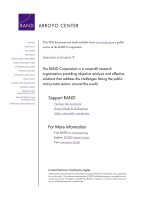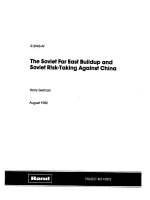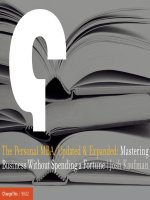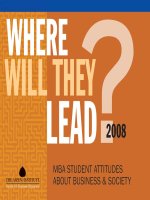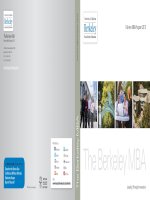The Personal MBA, Updated & Expanded: Mastering Business Without Spending a Fortune pot
Bạn đang xem bản rút gọn của tài liệu. Xem và tải ngay bản đầy đủ của tài liệu tại đây (1.73 MB, 94 trang )
| 98.02
ChangeThis
The Personal MBA, Updated & Expanded: Mastering
Business Without Spending a Fortune | Josh Kaufman
| 98.02
ChangeThis
MBA programs don’t have a monopoly on
advanced business knowledge.
You can teach yourself everything you need
to know to succeed in life and at work.
The Personal MBA features the very best
business books available, based on thousands
of hours of research. So skip business
school and the suffocating student loans:
you can get a world-class business education
simply by reading these books.
| 98.02
ChangeThis
What is the Personal MBA?
“You wasted $150,000 on an education you coulda got for a buck fifty in late charges
at the public library.”
— Will Hunting (played by Matt Damon), Good Will Hunting
“Self-education is, I firmly believe, the only kind of education there is.”— Isaac Asimov
The Personal MBA is a project designed to help you educate yourself about advanced business
concepts as quickly and inexpensively as possible. This manifesto will show you how to
substantially increase your knowledge of business on your own time and with little cost, all
without setting foot inside a classroom.
The Personal MBA is more flexible than a traditional MBA program, doesn’t involve going into
massive debt, and won’t interrupt your income stream for two years. Just pick up one of
these business books, learn as much as you can, discuss what you learn with others, then go
out into the real world and make great things happen.
If you’re interested in educating yourself about business, the Personal MBA is the best place
to start.
| 98.02
ChangeThis
The 99 Best Business Books Available
“If I read a book that cost me $20 and I get one good idea, I’ve gotten one of
the greatest bargains of all time.”
—Tom Peters
“The difference between where you are today and where you’ll be five years from
now will be found in the quality of books you’ve read.”
—Jim Rohn
The core of the Personal MBA self-study program is a list of the very best business books avail-
able. Some of these books will give you tools: processes or actions you can apply immediately to
improve your life and work. Others will give you ideas: help in envisioning what you and your
business are capable of becoming. All of them will give you mental models: useful ways of think-
ing about the world that you can use to your advantage in a wide variety of situations.
The Personal MBA is the tangible result of thousands of hours of reading, research, discussion,
and evaluation. By reading these books and applying what you learn to your daily life, you will
progressively develop a greater understanding of business and increase your effectiveness in
the working world. Each book in the list has been selected for a single purpose: to maximize your
educational return on invested time.
| 98.02
ChangeThis
For the Skeptics: Thoughts on Traditional MBA Programs
“Whatever be the qualifications of your tutors, your improvement must chiefly depend
on yourselves. They cannot think or labor for you, they can only put you in the best way
of thinking and laboring for yourselves. If therefore you get knowledge, you must acquire
it by your own industry.”
—Joseph Priestly, Dedication of New College, London, 1794.
The debate concerning the value of traditional MBA programs is long and involved, and this mani-
festo won’t close the issue. But there’s a growing body of research that suggests that MBA programs
provide very little value in relation to the direct and opportunity costs of completing the degree. For
more details, read “The End of Business Schools? Less Success Than Meets the Eye” by the Academy
of Management Learning and Education, which discusses this issue comprehensively.
For the sake of brevity, here’s a short Q&A on the pros and cons of business school:
Q: Can a traditional MBA program help you?
Maybe. You’ll meet a lot of great people and get acquainted with a few professors and corporate
HR recruiters who can help you land an interview at a large investment bank or consulting firm.
In exchange, you will sink deeply into debt. If you decide to enroll in a full-time MBA program,
you must also consider the opportunity cost of lost wages and dramatically reduced flexibility.
| 98.02
ChangeThis
Q: Will a traditional MBA teach you anything you can’t learn by yourself?
No. Classroom discussion can be beneficial, but there’s nothing presented in a traditional MBA
program that you can’t learn by studying a few good books on the subject. Remember, the value
of traditional MBA programs is not in learning: it is the connection to recruiters and other students.
Q: Is a traditional MBA worth your time and money?
It depends. If you want to become an investment banker or management consultant, or you’re
looking to go into advanced corporate accounting, finance, quantitative analysis, commercial
real estate, Fortune 500 management consulting, venture capital, or investment banking, an MBA
or MS in a business-related field may be expected or required. In those cases, caveat emptor:
once you decide to attend a traditional business school, the only certainty is that you’ll be up to
your eyeballs in debt for a few decades.
Just to be clear, here’s what I’m
not saying about traditional MBA programs:
• I’m not saying MBA programs are worthless or an abject waste of time and money.
If you’re aiming for a job at a Fortune 500, work in a field that directly rewards MBAs with
higher pay or increased responsibility, or your employer is willing to pay the cost of tuition, it
may make sense. If you’re an entrepreneur or middle manager at a company you like, your
time and energy is probably best spent working on your business and learning on your own.
| 98.02
ChangeThis
• I’m not saying you won’t learn anything useful in an MBA program. Like any other life
experience, what you learn is primarily determined by how much energy and attention you
choose to devote. You can learn many useful things in an MBA program—you just won’t learn
anything you can’t learn elsewhere, and you’ll waste a lot of time on things that simply aren’t
that important.
• I’m not saying that people who enroll in MBA programs are stupid. Prospective MBA
students tend to be intelligent, driven, and ambitious, which are major assets. The irony is
that the most promising MBA candidates are just as likely to succeed in business without an
MBA as they are with the diploma. According to Jeffrey Pfeffer, professor of organizational
behavior at Stanford, “If you are good enough to get in, you obviously have enough talent to
do well, regardless.”
Whether or not you decide that a traditional MBA program is right for you, the Personal MBA is an
effective, low-cost way to educate yourself about business. Even if you’re currently enrolled or
have graduated from business school, you can benefit from reading these books—many current
MBA candidates are active members of the Personal MBA community, and find a great deal of
value in reading beyond what’s required for their coursework.
| 98.02
ChangeThis
Before we get to the reading list, allow me to set a few reasonable expectations:
• The Personal MBA is not a credential. If you read these books, you won’t have corporate
recruiters beating down your door, and you won’t have a pretty certificate to hang on your
wall when you’re done. You will, however, have an understanding of business that’s compa-
rable to completing a traditional business school curriculum, along with the pleasures of not
having to mortgage your life for that understanding. You do not need a certificate to be able
to understand, use, and hold an intelligent conversation about advanced business topics.
(Employers do, however, respond well to portfolios. If you build a portfolio of notes to capture
what you learn through the Personal MBA, you’ll have a tangible asset to prove your hard
work and dedication during the interview process.)
• The Personal MBA is not a stand-alone venture. You can’t learn about business solely
from books (or sitting in a classroom); you have to be willing to go out and learn by doing.
Whether you’re working full-time for a company or building your own business, a great deal
of your knowledge will develop as a direct result of your day-to-day work experiences,
which provide the necessary context for understanding what you read. Reading books is
not enough; application of what you read is essential.
| 98.02
ChangeThis
• The Personal MBA is not a mindless replica of a traditional MBA program. The
Personal MBA was created to expose you to a core set of advanced business concepts
quickly and effectively. By design, it does not include everything you might come across
in business school. If you’re looking for a detailed analysis of the Black-Scholes option pricing
model and its relationship to the volatility surfaces of certain financial derivatives, you’re
going to be very disappointed. The Personal MBA focuses on knowledge that you’ll find useful
in the real world, not what an academic professor personally finds interesting.
• The Personal MBA is not an impersonal curriculum. You’ll find more material about
learning who you are, what you’re good at, and how to work more effectively with other
people in the Personal MBA than you will in a standard business school curriculum. There’s
a reason why these topics are included here: these “soft skills” are often more practical
and important than theoretical knowledge, and will help you tremendously in your everyday
life and work.
• The Personal MBA is not an infallible educational revelation. It’s perfectly okay if
you disagree with one of the selections or think that a critical book has been overlooked.
Feel free to make substitutions as you deem necessary (and leave your suggestions in the
comments section). If you’re skeptical about the value of a title you haven’t read yet, I
| 98.02
ChangeThis
encourage you to borrow the book from your local library and give it a try. If you’re of the
same opinion after reading a few chapters, put it down and read something else.
• The Personal MBA is not easy. Working your way through this list will take time, energy,
and persistence. There is no substitute for hard work and dedication. I’ve structured this
program to be as easy as possible to use, but it’s up to you to put in the time and energy
necessary to learn. It’s not easy, but it’s well worth your effort.
By reading these books and applying what you learn
to your daily life, you will progressively develop a
greater understanding of business and increase your
effectiveness in the working world.
“
| 98.02
ChangeThis
Reading List Selection Criteria
There are thousands of great books about business on the market, but not every book is right for
the Personal MBA. Here are the five criteria used to select the books featured by the Personal MBA:
Valuable, Action-Oriented Content. Does the book contain a lot of useful, practical infor-
mation about how business works, how you can add value, and why the material in the book is
important? Is the book based on scientific research or direct personal experience? Does it contain
tools, ideas, and concepts that can be put to use immediately in the real world?
Acceptable Time Commitment. Is the book a good educational value for the amount of time
invested? Can you get the key points of each book quickly?
Self-Learning Friendly. Is this book designed to keep the reader’s mind engaged? Does the
author present the material effectively and make the learning process enjoyable?
Reference Value. Will this book be a valuable resource to turn to when you need information
on a specific topic? How does the book re-read? Is it a book worth keeping for many years?
Comprehensive Set of Resources. For any business-related question, does at least one
of these books provide useful guidance and insight?
| 98.02
ChangeThis
Each recommendation is selected from a pool of hundreds of potential candidates, based on
thousands of hours of research and evaluation as well as the suggestions and recommendations
of a large and diverse group of volunteers.
The Personal MBA: Master the Art of Business
The first edition of the Personal MBA appeared on ChangeThis.com in August, 2005. Since then,
I’ve updated my recommended reading list every year, and I’ve partnered with Penguin/Portfolio
to publish a book of my own.
The Personal MBA: Master the Art of Business is a comprehensive overview
of what you’ll learn reading the books on this list. I wrote this book to
summarize the 248 most important ideas in business, psychology, and
systems theory.
I strongly recommend reading
The Personal MBA first. You’ll get much more
from the books on this list if you learn the most important concepts first. I
hope you find it useful.
And now, to the reading list
| 98.02
ChangeThis
Business Creation
Go It Alone by Bruce Judson
Year after year, surveys show that owning a business is a goal for over half of the
working adult population. Despite that, very few people muster the courage to actually
start a business. That’s a shame: starting and running a business can be much easier
than you think.
The premise of Go It Alone is simple: you can create a profitable business all by yourself, without em-
ployees, loans, or venture capital funding. The major trend shift that makes this possible is technology:
it’s now possible to make use of business services that used to cost tens of thousands of dollars for a
few dollars a month. Combined with the ability to hire help from all over the world in lieu of hiring
employees, smart entrepreneurs can make more money, set their own schedule, and choose their own
projects. Comparative advantage works.
Go It Alone changed the way I run my business, and I refer to it constantly. If you’ve been wondering
whether or not entrepreneurship is for you, read this book.
(Tip: you can read the entire book for free at BruceJudson.com, although I recommend picking up
a physical copy for quick reference.)
| 98.02
ChangeThis
The Lean Startup by Eric Ries
Starting a business is tricky. You have an idea, but you don’t know in advance whether
or not it will work. Jumping in and trying things helps you learn, but going too far can
be a recipe for losing money and precious time if your idea isn’t viable.
The Lean Startup will teach you the fundamentals of organizing a new business for
fast learning. Instead of investing money and time on blind faith, Ries explains how validating your
assumptions as quickly as possible is the true test in the early days of a new business.
Instead of spending lots of time and money developing the perfect offer only to have it flop when it’s
presented to the market, The Lean Startup provides many strategies for validating the worth of a
business idea. One core strategy is to develop a minimum viable product—the smallest offer you can
create that someone will actually buy, then offer it to real customers. If they buy, you’re in good
shape. If your original idea doesn’t work, you simply pivot and try another idea.
The Lean Startup also covers business analysis: what to measure when building a business. Instead
of measuring things that are easy and fun to measure (vanity metrics), Ries shows you how to measure
things related to the fundamental success of the business. Once your assumptions have been validated,
you can build the business with confidence, secure in the knowledge your continued investment will
pay dividends.
| 98.02
ChangeThis
The Knack by Norm Brodsky & Bo Burlingham
There are many popular misconceptions about what it takes to succeed as an entrepreneur.
The Knack can teach you what you need to know to create a successful company—the first
time you try.
In The Knack, you’ll learn how to manage your new venture by the numbers by focusing on
gross profit, identify and turn down bad sales, create appropriate incentive systems, manage a growing
company, and avoid common mistakes new entrepreneurs tend to make with their first business. An
ounce of prevention is worth a pound of cure, and Brodsky & Burlingham’s advice can keep you out of
trouble, as well as help you fix issues quickly when they happen.
The advice in The Knack can help you create a successful business, even if you have no experience.
Follow this advice, and you’ll become a street smart entrepreneur in no time.
Ready, Fire, Aim by Michael Masterson
Michael Masterson is a serial entrepreneur who has created over 20 business ventures in
his lifetime, and he has a unique perspective about what it takes to build a successful
company. Ready, Fire, Aim is a practical examination of how the priorities of a successful
business change as it grows.
| 98.02
ChangeThis
If you’re creating a brand new business, your most important priorities are (1) identifying your target
market; (2) quickly developing a product to sell to that market; (3) discovering your optimum selling
strategy; and (4) actually selling product. According to Masterson:
“Nothing matters more than selling. Many first-time entrepreneurs have the impression that they are
doing things in a logical order when they look for the perfect office space, have logos designed, and
order a lot of inventory. The reality is they are wasting valuable resources on secondary and tertiary
endeavors. If no one is going to buy what you want to sell, you’ve just wasted a bunch of money on a
business that will never be.”
As your business matures, your role as a founding entrepreneur changes from salesman to innovator,
then manager, and finally investor. As you progress through these four stages, your primary focus
should change as well to ensure your business successfully navigates the transition.
Escape from Cubicle Nation by Pamela Slim
If you’re sick and tired of “working for the man,” suffering through soul-sucking meetings
and typing up TPS reports, you’ve probably dreamt of breaking free and working for
yourself. Your heart longs to leave your bleak cubicle-bound existence behind, but you’re
scared—scared of making a bad decision, losing everything, and living in a van down
by the river.
| 98.02
ChangeThis
In the immortal words of Pamela Slim, “Hating your job intensely is not a business plan.” Escape From
Cubicle Nation is a comprehensive primer on how to make the leap from corporate employee to entre-
preneur—without freaking out.
Pam Slim is equal parts practical and supportive—exactly the right combination of qualities when you’re
equal parts wound up and stressed out. From crafting a workable business plan to dealing with details
like taxes and insurance, Escape From Cubicle Nation will help you stop dreaming and start making your
fledgling business a reality.
Bankable Business Plans by Edward Rogoff
Business plans serve two primary purposes: (A) clarifying your value proposition and
revenue model; and (B) convincing others that your business is sound enough to justify
an investment or a loan. Bankable Business Plans is a step-by-step guide that will teach
you everything you need to know to create a clear, comprehensive, and compelling
business plan.
Dr. Edward Rogoff has helped hundreds of prospective entrepreneurs create business plans as a profes-
sor at the City University of New York, and his advice in this book is straightforward and clear. Each
chapter will guide you through a specific section of your business plan: (1) value definition, (2) needs
assessment, (3) differentiation and competitive assessment, (4) market analysis, (5) marketing planning,
| 98.02
ChangeThis
(6) sales and promotion strategy, (7) organization design, (8) financing needs, (9) financial projections,
and (10) risk analysis.
Bankable Business Plans also features a rare bonus: it explains how to use data from the Risk Manage-
ment Association (RMA) to increase the accuracy of your financial projections, and thereby increasing
the likelihood of obtaining funding for your entrepreneurial venture. Using Dr. Rogoff’s approach, you’ll
be able to think through every aspect of your business and use RMA data to ensure your assumptions
are accurate. Several complete business plans are included as examples to help you get started.
Value-Creation & Testing
Rework by Jason Fried and David Heinemeier Hansson
Design is ultimately about making choices, and in order to make good choices, you must
know exactly what you want. Your personal design philosophy will impact every aspect of
your work, so it’s best to identify it as explicitly as possible.
37signals is a small firm in Chicago that specializes in creating web applications for small
businesses like Backpack, Basecamp, and Highrise. In Rework, the programmers and designers behind
37signals share their philosophy: stay small, embrace constraints, and build less.
| 98.02
ChangeThis
In Rework, you’ll learn why features are overrated; why taking outside funding should be your last
resort; why staying small and flexible is preferable to growing a company quickly; why constant
iteration is important; and why real prototypes are always better than design documents. Regardless
of whether you agree or disagree with the specific philosophy 37signals details in Rework, you’ll
find it very useful as you develop your own.
The New Business Road Test by John Mullins
So you have a business idea. How do you ensure it’s a good one before you commit your
savings and the next few years of your life to making it happen? Never fear: Professor
John Mullins of the London Business School is here to help. The New Business Road Test
is a systematic method of determining the viability of any business before you invest
time, effort, and resources in a new venture.
Fundamental flaws in your business model virtually guarantee that your venture will fail. In The New
Business Road Test, Mullins teaches you how to evaluate the strength of your prospective market,
analyze your competition, identify your advantages, and forecast your results.
Make no mistake: building a successful business requires dedication and effort, and many ultimately
fail. However, if you take the time to evaluate the opportunity before you act, you’ll dramatically
increase the odds that your venture will be sustainable and profitable.
| 98.02
ChangeThis
How to Make Millions with Your Ideas by Dan Kennedy
In business, you don’t necessarily get points for innovation: if profit is the goal, reapplying
a successful model is often the smartest move. How to Make Millions with Your Ideas is
the best book I’ve found to help you create a new business or improve the profitability of
your current firm.
Most profitable business ideas are simple: they focus on creating systems that can be multiplied and
duplicated without massive costs. A few of the many critical concepts presented in this book are:
premium pricing, exclusivity, niche marketing, up-selling, cross-selling, and franchising. You’ll also learn
how to become a recognized expert in your field, market products directly to the public, profit from
selling information, and build salable assets.
Marketing
All Marketers Are Liars by Seth Godin
Creating a product is only half of the battle—to succeed, you have to capture people’s
attention in a way that makes them want to buy from you. In All Marketers Are Liars, Seth
Godin explains the fundamentals of modern marketing: if you want your target market to
discover and purchase your product, you must tell a consistent, authentic, believable story
| 98.02
ChangeThis
that fits the way they view the world. If you’re able to understand your target market’s worldview, tell
your story in a distinctive and memorable way that fits that worldview, and fulfill their needs, you win.
In addition to foundational marketing concepts, you’ll pick up useful ideas like adoption curves, framing,
cognitive dissonance, the attention economy, and the all-pervading power of expectations. All Marketers
Are Liars will permanently change the way you think about marketing.
Permission Marketing by Seth Godin
The era of mass market advertising as a primary marketing strategy is over—it’s expensive,
annoying, and becoming less effective by the day. Permission Marketing teaches you
how to market your offerings in a fundamentally different and more sustainable way:
by “turning strangers into friends and friends into customers.”
Mass market advertising (like television, print, telemarketing, etc) rely on interruption to work—they
grab your attention without your permission, which is why people find these forms of marketing
irritating. The key to more effective marketing is “permission”: attracting your prospective customer’s
attention by doing something worth paying attention to, then obtaining their permission to continue
the conversation.
By helping you focus on providing value to your prospect instead of indiscriminately hawking your
wares, Permission Marketing will help you build a solid foundation for any modern marketing campaign.
| 98.02
ChangeThis
The 22 Immutable Laws of Marketing by Al Ries & Jack Trout
Marketing is the art of attracting attention and making people interested in what you have
to offer. In The 22 Immutable Laws of Marketing, you’ll learn time-tested ways to make
your offer stand out, even in the most competitive of markets.
The advice is simple and straightforward: be first in the customer’s mind. If you’re not first,
create a new category you can be first in. If your offer doesn’t stand out, it won’t sell. Ries and Trout
are masters of finding patterns in promotion—what works, and what doesn’t. The 22 Immutable Laws of
Marketing will help ensure your marketing efforts pay off the first time.
Getting Everything You Can Out of All You’ve Got by Jay Abraham
Jay Abraham is a marketing legend for good reason—his advice works. If you want to
attend one of Jay Abraham’s seminars, be prepared to pay up to $20,000. If you don’t want
to spend that much, pick up Getting Everything You Can Out of All You’ve Got.
According to Mr. Abraham, there are only three fundamental ways to increase the profit-
ability of your company: (1) increase the number of clients you serve; (2) maximize the size of each
sale; and (3) increase the number of purchases each client makes. If you combine these basic observa-
tions with the mindset that “it’s your moral duty to do everything in your power to serve your client’s
best interest,” you’re on the road to business success.
| 98.02
ChangeThis
Ultimately, you receive money in exchange for providing value to others, so focusing squarely on ways
to increase the amount of value you provide to your clients is fruitful territory for exploration. You
must learn how to provide that value effectively, communicate that value in a distinctive and memorable
way, overcome objections to purchase, and ensure your clients are absolutely satisfied with their
purchase and are excited to buy again.
Sales
The Psychology of Selling by Brian Tracy
Selling can be tough. Prospects often treat you with skepticism, complain about the
price, give you the runaround, and waste your time without buying. Every day, you
risk rejection, frustration, and lost opportunities. If you don’t close the sale, you don’t
get paid. It’s little wonder people find it difficult to sell consistently.
The Psychology of Selling is a comprehensive course on day-to-day sales fundamentals.
Brian Tracy is a veteran salesperson with experience in many different industries, and he’s isolated
the key principles, strategies, and techniques involved in convincing prospects that your offer is more
valuable than the asking price.
| 98.02
ChangeThis
In The Psychology of Selling, you’ll learn how to break a prospect’s preoccupation with other matters,
attract and maintain attention, present your offer in the best possible light, answer questions and
overcome barriers to purchase, and close the deal when the prospect is ready to buy. You’ll also learn
how to manage your own psychology as you sell, keep your confidence high (and desperation low),
avoid sales resistance, and systematically improve your skills until you are one of the top 10% of sales-
people in your field.
Pitch Anything by Oren Klaff
A funny thing happens when you combine the old art of selling with the new science of
neuropsychology: you realize you’ve been suffering from Caveman Syndrome. Your
modern mind is capable of presenting complex logic and data, but when you pitch a
potential customer, they’re evaluating your presentation with the most ancient parts
of their brain. That fundamental mismatch is a recipe for poor results.
In order to close the deal, your job as a salesperson is to grab and maintain the prospect’s attention
and interest, help them recognize your offer as an opportunity, and cultivate their desire for what you
have to offer. To accomplish these objectives, you must fully appreciate that your prospect is evaluating
you and your offer at a very primal level: who is dominant in the situation, who exhibits the most
confidence, who is chasing and who is being chased, and whether or not a new piece of information
is worth considering.
| 98.02
ChangeThis
Pitch Anything has fundamentally changed how I think about the sales process. The human brain unde-
niably works in particular ways, regardless of how we might prefer it to work. Tune your pitch to your
prospect’s ancient brain, and you win.
The Ultimate Sales Machine by Chet Holmes
Books about sales are a dime a dozen, and I’ve reviewed several dollars worth. Most
of them try to pump you up, then give you several thousand great-sounding-but-vague-
and-close-to-useless tips on how to get more prospects and close the sale. This book
is different.
In this book, Chet Holmes focuses squarely on the fundamentals: (1) make the best use of your limited
time; (2) institute high standards and individual employee training; (3) hold regular company meetings
to inform and train your employees as a group; (4) develop your core story and educate your customer;
(5) attract and hire superstars; (6) target your very best prospects; (7) perfect your marketing tactics; (8)
perfect your presentation; (9) perfect your company’s sales process; (10) perfect your personal selling
skills; (11) bond with your client via follow-through and follow-up; and (12) set aggressive goals and
systematically measure your performance over time.
The Ultimate Sales Machine is one of my favorite sales books of all time for a simple reason: it’s based
on the author’s personal experience of improving the sales of hundreds of companies over many, many
years. You won’t find fluffy theory in this book—just 12 clear priorities that will help you improve your
profit margins and make more sales.

